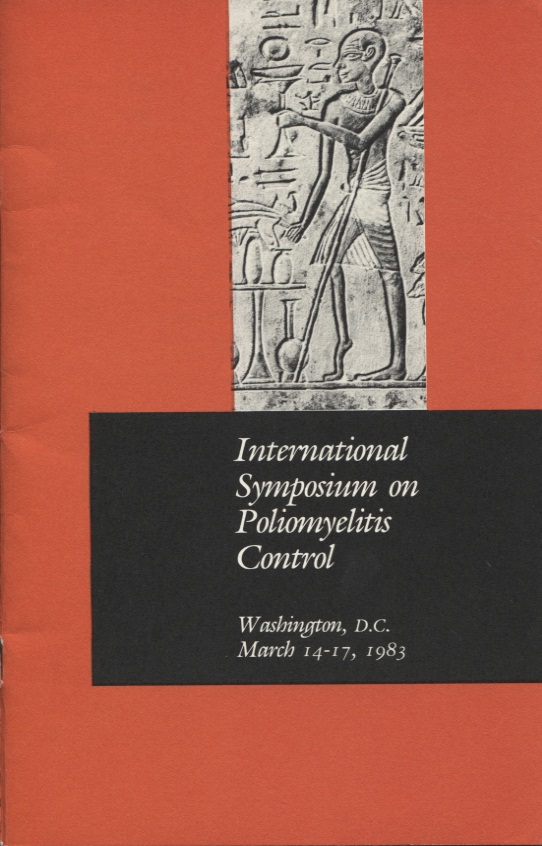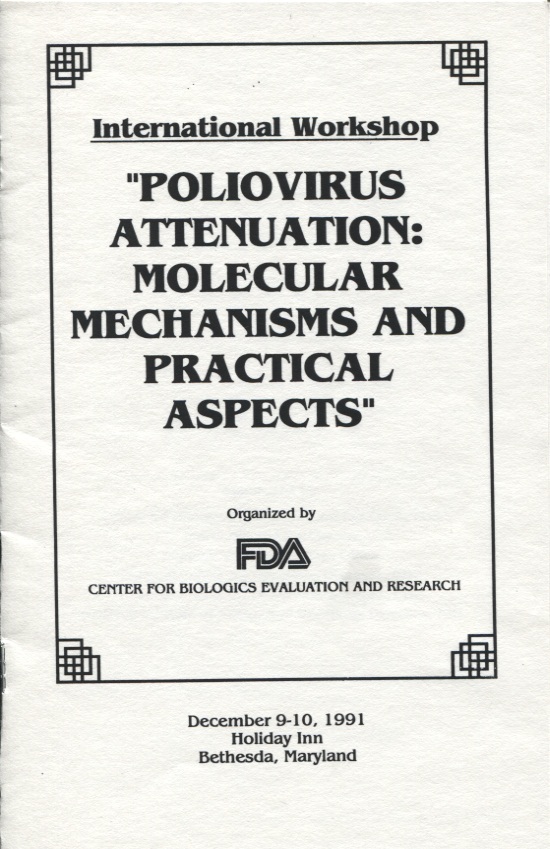
Program from the 1983 International Symposium on Poliomyelitis Control, where Dr. Racaniello met Dr. Sabin for the first time.
The Sabin digitization project has provided me with opportunities to connect with different people about Dr. Sabin and his collection. Last week, I had the chance to speak with Dr. Vincent Racaniello, whom I wrote about in a blog post called “An Influential Man” in February 2012. Dr. Racaniello has been studying viruses for over 30 years and is currently a Professor of Microbiology at Columbia University Medical Center. I thought I would share a little bit from the interview with you, especially since it was really interesting to talk to someone who has been studying virology (particularly polio) for such a long time and seems very passionate about teaching people about the subject.
As I mentioned in the February blog post, one of Dr. Racaniello’s first encounters with Dr. Sabin was through a letter Dr. Sabin wrote to Dr. Olen Kew. The letter contained some strongly worded criticisms of molecular biologists. As a young researcher, Dr. Racaniello recalled being “flabbergasted” by the letter because it was one of the first times he had encountered someone who told him and every other molecular biologist that they didn’t know what they were talking about.
In 1983, Dr. Racaniello met Dr. Sabin at the International Symposium on Poliomyelitis Control held at the Pan American Health Organization in Washington, DC. Dr. Racaniello was among the scientists presenting at the symposium, and he mentioned remembering that he was very nervous because prominent researchers such as Dr. Joseph Melnick, Dr. Jonas Salk and Dr. Sabin were in attendance. Dr. Racaniello recalled that Dr. Melnick even cited his article during a session at the symposium. After one of the sessions, Dr. Racaniello introduced himself to Dr. Sabin, telling him that he had planned to work with the Lansing strain of poliovirus in mice. According to an article Dr. Racaniello published that discusses this same encounter, Dr. Sabin told him, “It might give you a quick answer, but it won’t tell you the whole story.”[1] Then Dr. Sabin held up his banana and told him he was going to have his lunch.
Of course, the Winkler Center has a folder in the Sabin collection that contains materials from this symposium, including the program seen above. Dr. Sabin used the program to scribble some notes about the session on “Prospects for Worldwide Control of Paralytic Poliomyelitis.”

This is a program from a workshop on poliovirus attenuation that both Dr. Sabin and Dr. Racaniello attended in 1991.
Dr. Racaniello recalled a couple of other meetings where he encountered Dr. Sabin. He recalled seeing Dr. Sabin sitting in the front row of a lecture, raising his hand, and making statements rather than asking questions. At one meeting sponsored by the National Institutes of Health, Dr. Racaniello recalled that during a session he was chairing, Dr. Sabin started to take control of the session. Dr. Melnick, who was also in attendance, remarked that Dr. Sabin was being himself again, and cautioned Dr. Racaniello that, “If you don’t control him, he’ll control the whole meeting.” This story made me chuckle, especially after reading so many letters written by Dr. Sabin. It was interesting to hear a story of Dr. Sabin and imagining this man of many opinions in action.
It was clear throughout the interview of Dr. Racaniello that he respected Dr. Sabin very much. Although polio research has changed in the years since Dr. Sabin passed away, it was really cool to hear how Dr. Racaniello still keeps Dr. Sabin’s words in mind when conducting research.
Dr. Racaniello is very active in the world of social media, producing a podcast, writing a blog on virology, and using Twitter to reach different audiences. To learn more, visit:
- This Week in Virology – Dr. Racaniello gives a “shout out” to the Sabin project in TWiV 181.
- Virology Blog – Dr. Racaniello discussed some letters he received from Dr. Sabin in a post from January 19, 2009.
- Dr. Racaniello’s Twitter account
References
Note: Much of this information comes from an interview with Dr. Vincent Racaniello conducted on 27 April 2012.
[1] Racaniello, V.R., “Infectious cDNA, Cell Receptors, and Transgenic Mice in the Study of Sabin’s Poliovirus Vaccines,” Biologicals 21 (1993): 366.
In 2010, the University of Cincinnati Libraries received a $314,258 grant from the National Endowment for the Humanities (NEH) to digitize the correspondence and photographs of Dr. Albert B. Sabin. This digitization project has been designated a NEH “We the People” project, an initiative to encourage and strengthen the teaching, study, and understanding of American history and culture through the support of projects that explore significant events and themes in our nation’s history and culture and that advance knowledge of the principles that define America. Any views, findings, conclusions, or recommendations expressed in this blog do not necessarily reflect those of the National Endowment for the Humanities.
